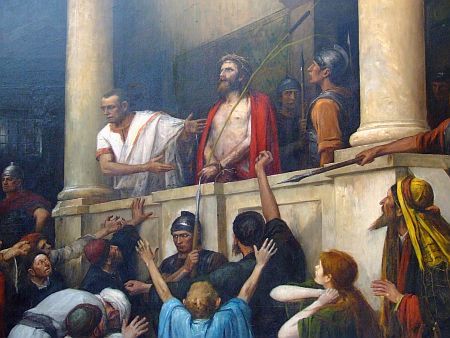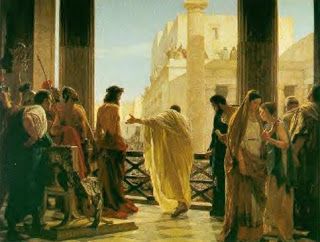Warner Bros. recently acquired Pontius Pilate, a script by Vera Blasi (Woman on Top) about the Roman prefect who presided over Jesus' trial and was convinced by the crowd to sentence Jesus to death. Even in his limited appearance in the Biblical canon, Pilate is portrayed as conflicted, reluctant to send a man he believes to be innocent to such a fate. Blasi has stated that in addition to "the available facts from Roman and Jewish history books and the four gospels," she speculates to follow Pilate from childhood, showing his time in the military and his rise to political office. Blasi intends to use this character study as a launching point for "an investigation of the politics of Judea at the time, and what it was like to be occupied by Rome."All that is enough to intrigue me... and Brad Pitt. Deadline reports Pitt is circling the lead role. Pontius Pilate will provoke controversy no matter who stars, but Pitt's star power and politics would magnify that, should he sign on. Hit the jump for more on Pilate.The passage in Matthew 27 is short and worth a read:
Early in the morning, all the chief priests and the elders of the people made their plans how to have Jesus executed. So they bound him, led him away and handed him over to Pilate the governor...
Meanwhile Jesus stood before the governor, and the governor asked him, “Are you the king of the Jews?â€
“You have said so,†Jesus replied.
When he was accused by the chief priests and the elders, he gave no answer. Then Pilate asked him, “Don’t you hear the testimony they are bringing against you?â€Â But Jesus made no reply, not even to a single charge—to the great amazement of the governor.
Now it was the governor’s custom at the festival to release a prisoner chosen by the crowd.  At that time they had a well-known prisoner whose name was Barabbas. So when the crowd had gathered, Pilate asked them, “Which one do you want me to release to you: Barabbas, or Jesus who is called the Messiah?â€Â For he knew it was out of self-interest that they had handed Jesus over to him.
While Pilate was sitting on the judge’s seat, his wife sent him this message: “Don’t have anything to do with that innocent man, for I have suffered a great deal today in a dream because of him.â€
But the chief priests and the elders persuaded the crowd to ask for Barabbas and to have Jesus executed.
“Which of the two do you want me to release to you?†asked the governor.
“Barabbas,†they answered.
“What shall I do, then, with Jesus who is called the Messiah?†Pilate asked.
They all answered, “Crucify him!â€
“Why? What crime has he committed?†asked Pilate.
But they shouted all the louder, “Crucify him!â€
When Pilate saw that he was getting nowhere, but that instead an uproar was starting, he took water and washed his hands in front of the crowd. “I am innocent of this man’s blood,†he said. “It is your responsibility!â€
All the people answered, “His blood is on us and on our children!â€
Then he released Barabbas to them. But he had Jesus flogged, and handed him over to be crucified.
To be fair, Pilate was forced into a difficult position. But that is part of the job description for a politician. Rather than stand on principle, he passively turned the decision over to an angry mob and literally washed his hands of the situation. I only know this Pontius Pilate, so I am curious to see the context that (I assume) places Pilate in a more sympathetic light over the course of the film. Deadline read the script, and shared this perspective:
"[Pilate's] arrogance and inability to grasp the devoutness of the citizenry and its hatred for the Roman occupiers and their pagan gods leads him to make catastrophic decisions. All of this puts him in a desperate situation and in need of public approval when he is asked to decide the fate of a 33-year old rabbi accused by religious elders of claiming he is King of the Jews. Along the way, such Roman emperors including Caligula and Tiberius and New Testament figures like John the Baptist, Salome and Mary Magdalene are seen in a tale that culminates with Pilate’s fateful decision to allow Jesus Christ to be crucified."
I am wary that Blasi presents this as something more than historical fiction, claiming it is "80% fact" based on 10 years of research. But it sure looks to be compelling historical fiction, Pitt or no Pitt.


